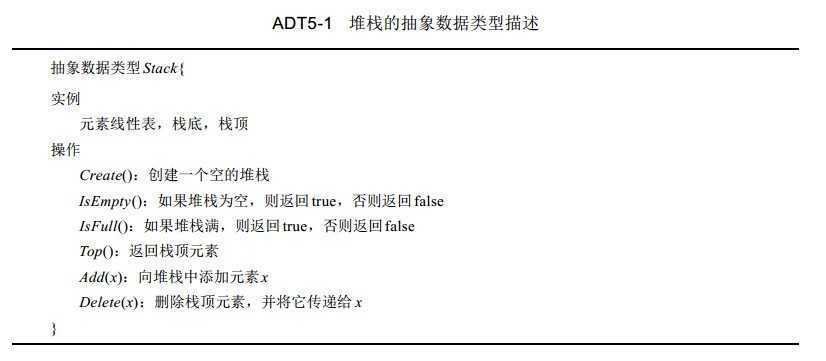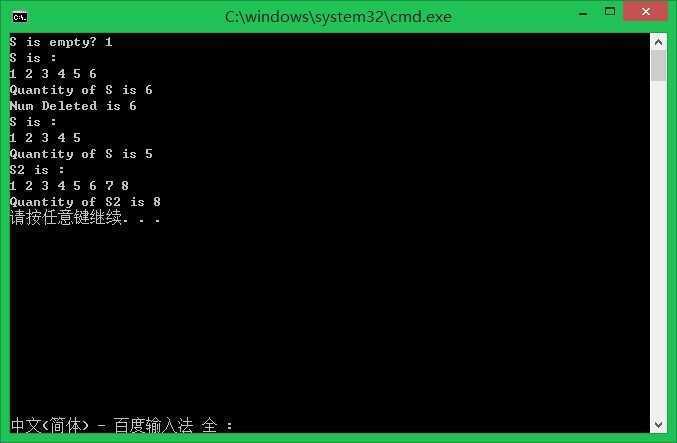标签:
堆栈和队列可能是使用频率最高的数据结构,二者都来自于线性表数据结构(经过某种限制以后)。堆栈数据结构是通过对线性表的插入和删除操作进行限制而得到的(插入和删除操作都必须在表的同一端完成),因此,堆栈是一个后进先出( last-in-first-out, LIFO)的数据结构。
1、定义
定义 [堆栈] 堆栈( s t a c k)是一个线性表,其插入(也称为添加)和删除操作都在表的同一端进行。其中一端被称为栈顶( t o p),另一端被称为栈底( b o t t o m)。
ADT:

2、公式化描述
堆栈是一种特殊的线性表,因此它可以使用数组或链表实现。使用数组实现即使公式化描述实现。
令栈顶元素存储在 e l e m e n t [ l e n g t h - 1 ]中,栈底元素存储在 e l e m e n t [ 0 ]中。堆栈元素存储在数组s t a c k之中, t o p用于指向栈顶元素。堆栈的容量为 M a x To p + 1 。
3、代码实现
模板类:
(exceotionerror.h见队列的实现:公式化描述)
1 #ifndef ARRAYSTACK_H 2 #define ARRAYSTACK_H 3 #include "exceptionerror.h" 4 5 template<class T> 6 class ArrayStack 7 { 8 public: 9 ArrayStack(const int& MaxStackSize = 10); 10 ArrayStack(T* s, const int& n,const int& MaxStackSize=10); 11 ~ArrayStack() 12 { 13 if (stack!=NULL) 14 { 15 delete[] stack; 16 } 17 } 18 friend std::ostream& operator<<(std::ostream& output,const ArrayStack<T>& s) 19 { 20 if (s.IsEmpty()) 21 { 22 output << "Stack is empty" << std::endl; 23 } 24 else 25 { 26 for (int i = 0; i <= s.top;++i) 27 { 28 output << s.stack[i] << " "; 29 } 30 } 31 32 return output; 33 } 34 bool IsEmpty()const{ return top == -1; } 35 bool IsFull()const{ return top == MaxTop; } 36 T Top()const; 37 ArrayStack<T>& Add(const T& x); 38 ArrayStack<T>& Delete(T& x); 39 int Quantity()const 40 { 41 return top + 1; 42 } 43 private: 44 int top; 45 int MaxTop; 46 T* stack; 47 }; 48 49 template<class T> 50 ArrayStack<T>::ArrayStack(const int& MaxStackSize=10):MaxTop(MaxStackSize-1),top(-1) 51 { 52 stack = new T[MaxStackSize]; 53 } 54 55 template<class T> 56 ArrayStack<T>::ArrayStack(T* s, const int& n,const int& MaxStackSize):MaxTop(MaxStackSize-1),top(n-1) 57 { 58 if (top>MaxTop) 59 { 60 throw OutofBounds(); 61 } 62 else 63 { 64 stack = new T[MaxStackSize]; 65 memcpy(stack, s, n*sizeof(T)); 66 } 67 } 68 69 template<class T> 70 T ArrayStack<T>::Top()const 71 { 72 if (IsEmpty()) 73 { 74 throw OutofBounds(); 75 } 76 else 77 return stack[top]; 78 79 } 80 81 template<class T> 82 ArrayStack<T>& ArrayStack<T>::Add(const T& x) 83 { 84 if (IsFull()) 85 { 86 throw NoMem(); 87 } 88 else 89 { 90 stack[++top] = x; 91 return *this; 92 } 93 } 94 95 template<class T> 96 ArrayStack<T>& ArrayStack<T>::Delete(T& x) 97 { 98 if (IsEmpty()) 99 { 100 throw OutofBounds(); 101 } 102 else 103 { 104 x=stack[top--]; 105 return *this; 106 } 107 } 108 #endif
测试代码:
1 #include "ArrayStack.h" 2 3 int main() 4 { 5 ArrayStack<int> S; 6 std::cout << "S is empty? " << S.IsEmpty() << std::endl; 7 S.Add(1); 8 S.Add(2); 9 S.Add(3); 10 S.Add(4); 11 S.Add(5); 12 S.Add(6); 13 std::cout << "S is :" << std::endl; 14 std::cout << S; 15 std::cout << std::endl; 16 std::cout << "Quantity of S is " << S.Quantity() << std::endl; 17 int x; 18 S.Delete(x); 19 std::cout << "Num Deleted is " << x << std::endl; 20 std::cout << "S is :" << std::endl; 21 std::cout << S; 22 std::cout << std::endl; 23 std::cout << "Quantity of S is " << S.Quantity() << std::endl; 24 25 int a[8] = { 1, 2, 3, 4, 5, 6, 7, 8 }; 26 ArrayStack<int> S2(a, 8); 27 std::cout << "S2 is :" << std::endl; 28 std::cout << S2; 29 std::cout << std::endl; 30 std::cout << "Quantity of S2 is " << S2.Quantity() << std::endl; 31 system("pause"); 32 return 0; 33 34 }
输出:

标签:
原文地址:http://www.cnblogs.com/haoliuhust/p/4256743.html